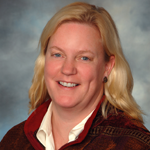PA Faculty with a World of Experience
October 30, 2017
 In 1983, Diana Smith, MHS was a senior biology major at Wake Forest University. As students from that major have a tendency to pursue jobs in teaching, research or medicine, posters extolling the virtues of these various careers lined the hallways of the biology department. That is where Smith first became aware of the physician assistant (PA) profession.
In 1983, Diana Smith, MHS was a senior biology major at Wake Forest University. As students from that major have a tendency to pursue jobs in teaching, research or medicine, posters extolling the virtues of these various careers lined the hallways of the biology department. That is where Smith first became aware of the physician assistant (PA) profession.
Although it piqued her interest, she wasn’t ready to return to school immediately after completing her undergraduate studies. Instead, Smith moved to Massachusetts where she lived on boats and worked as an assistant scientist teaching oceanography. It gave her a much-needed break from academia.
Once she realized it was time to get serious about her career, Smith remembered the poster she saw at Wake Forest. “I always had medicine in the back of my head. The PA profession resonated with me, well, for a lot of different reasons, but I liked the idea of approaching patient care sort of in a partnership with a physician,” she said. She was also drawn to the flexibility and balance becoming a PA could offer. PAs are trained in primary care and are often able to move laterally across different specialties, sometimes with further training or by completing a residency program. She felt this would afford her a better quality of life than becoming a medical doctor. So, in 1987, Smith decided to go back to school and enrolled at Hahnemann University.
After graduating with her master’s in health science in 1989, Smith began practicing clinically. She acted as a clinical preceptor for Hahnemann PA students, and it wasn’t long before she was invited by the program to apply for a faculty position. The move to teaching seemed like the right direction for Smith. "I wanted to go into education because I felt in order to maintain the quality of the profession, you had to have a quality education. I felt very strongly that good, quality education had to exist if we’re going to put out good, quality PAs into the workplace. I felt I could contribute to that.” The decision was made easier by the fact that she would not have to give up her clinical practice.
In fact, after several years, Smith returned full time to clinical practice. She worked in the medical office for the Peace Corps volunteers in Albania for several years. “The support for medical systems in Albania was not very good. They were practicing medicine from the 1940s with Russian textbooks. Albania had been under a dictatorship and its borders were closed. They had just reopened in the 90s, so it was really an eye-opener to be in an ex-communist country. It was stepping back in time in a lot of ways,” said Smith.
After returning to the U.S., Smith returned to what had now become Drexel’s College of Nursing and Health Professions. Since that time, Smith has stopped practicing clinically but has filled that time working with volunteer programs. She has gone on several local and international mission trips providing healthcare, most often in the Dominican Republic. “I go with a church group that goes down there and works in the Bateyes, which are the sugarcane communities that migrant workers, most from Haiti, live in.”
Smith also uses her passion for working internationally as the curriculum director for the PA program here at Drexel. The program is currently in a five-year memorandum of understanding with the University of Worcester in the UK, the first university in the UK to implement a master’s degree program for the PA profession which is relatively new across the pond. The two programs have joined to work as a mentoring partnership to develop research and participate in faculty exchanges.
In addition to her role at Drexel, Smith is also one of 70 nationally selected Accreditation Review Commission on Education for the Physician Assistant (ARC) compliance officers and site visitors and is trained as a chaplain for a hospital. “It's a lot of balls to juggle, but I love what I do. Working with the people that I do in the PA department is such a pleasure. I just feel very supported by the faculty and by my program director in everything. It's great to be part of a good team,” she said.
As for current PA students, Smith wants you to know: “There is a light at the end of the tunnel! This is an incredibly demanding program, and we all understand that. Sometimes you can get lost in the details. But you will be very well prepared to enter the workforce as a primary care PA. Put patients first and follow your vision. Always remember that you're really in a service profession. You're serving others. As a PA you have so much available to you in so many capacities and specialties. So whatever is your interest there's nothing to hold you back.”
Written by Maggie McCrea